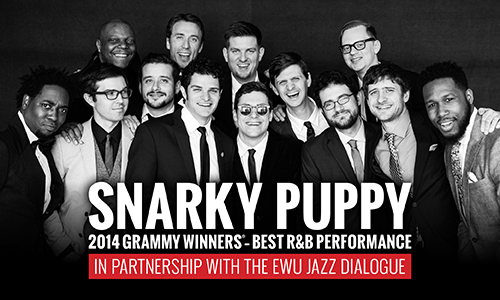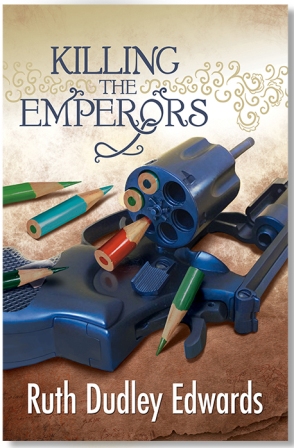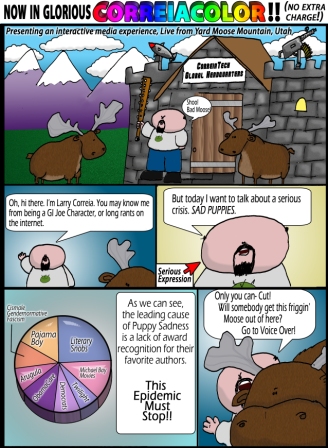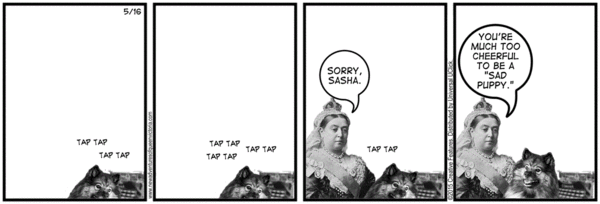aka The Pup Who Circumnavigated Hugoland In A Slate Of His Own Making
The roundup includes Lela E. Buis, Samantha Noll, David Gerrold, Max Florschutz, Vox Day, Alexandra Erin, Jim McCoy, David Mack, Wei Ming Kam, Lis Carey, Pluviann, Chad Orzel, Bonnie McDaniel, Ursula Vernon, May Tree, Laurie Mann and less identifiable others. (Title credit goes to File 770 contributing editors of the day Jim Henley and Alexandra Erin. Update: In case you’re keeping score at home, the subtitle is similar to one previously contributed by DMS, but not identical.)
Lela E. Buis
“SJWs in space” – May 30
The Puppies debate has some interesting facets, and it’s also an unusual opportunity to observe a little human behavior. One of the main accusations of the Puppies’ spokesmen Theodore Beale (aka Vox Day), Brad Torgersen and Larry Correia is that SF&F has been taken over by social justice warriors (aka SJW) who are pushing a liberal and literary agenda while forcing out old fashioned, right-leaning SF&F. I’ve just been reading about social justice, as it turns out. According to Professor Michael Reisch the definition of social justice is fairly open to question. This mutability means that different groups tend to co-opt the activist strategy and organize to advance their own definition of what social justice really is. Clearly, the Puppies have taken on the mantle and have now become social justice warriors, the very thing they have been loving to hate.
Samantha Noll on Dispatches from the Philosophy of Science Association’s Women’s Caucus
“A War of Words and Ideas: Philosophy, Science Fiction, and the Hugo Award Controversy” – May 30
So why is this important for society in general and for philosophers of science in particular? The answer to this question may become clearer when we reflect on why fringe groups are escalating their campaigns in science-fiction and other genres aimed at disenfranchising and silencing entire groups of people. As Kameron Hurley of The Atlantic argues “the truth is that our wars of words and narrative matter, especially those that tell us what sorts of possible futures we can build—and groups like Gamergate, Sad Puppies, and Rabid Puppies understand this.” During a time where the United States is becoming ever more diverse and citizens’ views ever more liberal, the push to suppress this trend is becoming ever more rabid, to appropriately apply Beale’s terminology. Barring those writing from diverse standpoints from receiving formal recognition helps to limit the exposure of these works and thus silences the authors. This is one of the reasons why it is important for those living in a democratic and multicultural society to ensure that those like Beale and Correia are not successful.
David Gerrold on Facebook – May 29
Worldcons, as we know them, have been around since 1939. Hugos have been awarded since 1953
Thousands of people have invested an enormous amount of time and energy into keeping the traditions of the World Science Fiction Convention going. Thousands have invested an enormous amount of time and energy in developing an award system designed to acknowledge excellence in the craft.
No award system is perfect — but it’s hard to argue with a system that has recognized the excellence of Dune, Left Hand Of Darkness, Starship Troopers, Ringworld, The Stars My Destination, Dragonflight, Stand On Zanzibar, Flowers For Algernon, City On The Edge Of Forever, Aye And Gomorrah, Blink, and other works that not only represent the best of the year — they also redefine what’s possible in the genre.
To some extent, there is an element of popularity in the voting. To some extent, there is an element of promotion by publishers and authors. To a larger extent, the problem with the Hugos is that the field has gotten so big and so sprawling that it’s impossible for any fan to be as widely read as in the past. This is why recommended reading lists are a great help.
There’s also a tradition of respect in fandom.
David Gerrold on Facebook – May 29
Some people have advocated going to Amazon and Goodreads and other sites to post one-star reviews of works by authors whose views they oppose.
Please, don’t do it.
It’s a failure of integrity.
If you’ve read the work, then post your honest opinion, good or bad. But punishing an author by down-voting his/her work — that’s not fair to the author, to the work, or to readers who are looking for useful reviews.
If you’re claiming to be one of the good guys, you gotta act like it.
Max Florschutz on Unusual Things
“I’m Not a Fan of Science-Fiction and Fantasy?” – May 30
I may not be a Science-Fiction and Fantasy fan.
Which is shocking. I always thought I was one. But no, according to a lot of these posts and comments I’m seeing and reading, I am not a “fan.” Or, to use the terms that some of the insulars have started to use, I am not a “trufan,” a term which, quite honestly, reminds me quite a bit of the ridiculous amount of self-inflicted (and mostly declarative) segregation in the gaming community between the “PC Master Race” and the “Console Gaming Peasants.” The console gamers aren’t really gamers, you see. They’re just casuals.
Caitlin on Devourer of Words
“Why I am voting for the Hugo Awards this year” – May 30
In general, I am disappointed that a small number of people think they have the right to dictate what the genres of sci-fi and fantasy consist of. In particular, people like Vox Day make me physically ill, and I don’t want promising new authors with awesome new ideas to leave the genre because of them. Vox Day in particular deserves to be defended against: this is a guy who doesn’t believe women should be allowed to vote…
Vox Day onVox Popoli
You know, we’ve wondered who was going to the new Hitler ever since Mahmoud Ahmadinejad proved to be such a washout in that regard. My money was on Putin, so I had absolutely no idea it would turn out to be me. Someone get Hugo Boss on the line, we’re going to need some snappy new outfits for the VFM, stat! Let’s address the issues as Mr. Flint, real deal SJW, puts them forth.
- I don’t share Hitler’s views on race, as I have a basic grasp of human genetics and I am neither a eugenicist nor an Aryan supremacist.
- On the subject of Jews, I am a Zionist who edits and publishes the eminent Israeli military historian Dr. Martin van Creveld.
- I’m not opposed to women learning to read and write. I am opposed to women being encouraged to obtain advanced degrees in the place of husbands and children. Unlike Mr. Flint, I can do the demographic math.
- I don’t support honor killings. I never have.
- I don’t hide what I really believe. Mr. Flint claims to know what I really believe without me ever putting it into words because, and I quote, “peekaboo”. If anyone is “a fucking clown” here, it is observably Mr. Flint.
- I’m not trying to win Hugo Awards. I don’t care about winning awards.
- I have no delusions of grandeur. I’m not the one who keeps running to The Guardian, Entertainment Weekly, The New Zealand Herald, NPR, Popular Science, or the Wall Street Journal to talk about me. I haven’t issued a single press release or called a single member of the media about the Hugo Awards or anything else, for that matter.
- Western civilization is in peril. In large part thanks to idiots like Mr. Flint.
- I don’t like to portray myself with a flaming sword. That was the brainchild of the Star Tribune photographer who was taking pictures of me for a story the paper was doing. Apparently he was onto something, as it’s an image many people have remembered….
Alexandra Erin on Blue Author Is About To Write
“How big is the doghouse?” – May 30
So, Kate Paulk has been tapped as the standard-bearer of next year’s Sad Puppies campaign. She has declared that next year’s Hugo ballot-stuffing initiative will be done in a transparent and democratic manner. This does not fill one with confidence, since Brad Torgersen has made the same claims about this year’s ballot-stuffing initiative.
It also needs to be pointed out that it hardly matters who leads the Sad Puppies campaign or what they do or how they do it, as this year’s otherwise failed campaign only managed to achieve accidental relevance through the fact that the successful Rabid Puppies campaign largely copied and pasted their agenda.
With all that in mind, I have to say that I’m interested in Kate Paulk’s post about what she considers to be Hugo-worthy work only as an academic matter. If the list she assembles using it winds up being the ballot, it will likely be only because someone truly nasty as well as small-minded got behind her and started shoving, as happened this year.
Jim McCoy on Jimbos Awesome SFF Book and Movie Reviews
“Kate Paulk’s ConVent” – May 30
Before I get too far into the book, I wanted to mention Kate’s involvement with the Sad Puppies. She is next year’s evil, evil, evil ringleader. If you support evil, mean people who evilly think that you should evilly vote for good fiction written by evil people who evilly put story over message (because they’re evil) she’s worth supporting. Oh, and her book also kicks ass, but we’ll get to that in a minute. I just wanted to take a minute to give evil praise to Her Evilness, The Duchess of Snark. Does that make me evil? Probably. I’m OK with that. Now, onto the book.
Vox Day on Vox Popoli
“The Ones Who Walk Away from Fandom” – May 30
It’s more than a little amusing. And those who walk away are the wise ones, because, as it has been sung:
Never kick a dog
Because it’s just a pup
You’d better run for cover when the pup grows up!
A Rabid Puppy #Hugo nominee put a sample in the awards packet that features direct insults to me & my work. Can I have my SJW badge now?
— David Mack (@DavidAlanMack) May 31, 2015
Wei Ming Kam on Fantasy Faction
“The pros and cons of the voting processes behind major SFF awards: Part 2” – May 31
This year, there is reportedly a massive upsurge in people buying supporting memberships of Sasquan, so basically people want to vote in the awards but have no interest in going to the con. Normally, the number of people who vote in the awards is small, so it’s reasonable to say that the upsurge is a result of the resentful manchildren making this year’s awards political. SADFACE. SAD SASQUATCH SADFACE.
Lis Carey on Lis Carey’s Library
“The Revenge of Hump Day–Hugo Nominated Best Fanzine” – May 31
It’s all perfectly competently and clearly written. I’m sure it’s well-received by its intended audience. On the other hand, I don’t see any exceptional excellence.
Lis Carey on Lis Carey’s Library
This one I did not expect to like. I got a surprise. It’s intelligent, thoughtful, does some really interesting things, and Suzie, as an adult, is a librarian, and a well-done librarian is always a win for me, Yes, it’s self-indulgent. So sue me.
Pluviann on The Kingfishers Nest
“On a Spiritual Plain – Lou Antonelli” – May 30
Imagine a great caravan of giant aliens travelling across a bleak and open plain, above them the most glorious auroral display fills the sky, and travelling with them is a human chaplain on a segway enclosed by faraday cage. This image comes from Lou Antonelli’s ‘On a Spiritual Plain’ and it deserves fanart. It’s the best part of the short story, and the idea of a faraday segway in particular really tickled me.
Award-Winning Reading
“Best Fan Artist” – May 28
Fun fact: I almost voted No Award for this entire category. Now I’m voting for Elizabeth Leggett and No Award for everything else. I went looking at each nominees website to make sure that I was looking at everything that is award eligible. Ninni Aalto, Brad W. Foster and Steve Stiles all have similar styles (to my very untrained eye) that just does not appeal to me. Add in that I didn’t find the subject matter that interesting, and there is no reason for me to vote for any of them. I like that Spring Schoenhuth’s work consists mostly of jewelry. I don’t really recognize most of it though, and again the style doesn’t really appeal to me, so I won’t vote for her.
Award Winning Reading
“Totaled by Kary English” – May 29
There is some science talk in this story, but it was unobtrusive and easy to understand. It was just enough to give the story weight without pulling attention away from the storyline. The writing is beautiful. Descriptive, but concise. It really drew me into the story in a way that I was not expecting.
Award-Winning Reading
“On a Spiritual Plain by Lou Antonelli” – May 28
I liked the writing style. Not overly wordy but descriptive enough to ground the reader. I do also like that the story made me confront the idea that I decided what the story was about when I was halfway through and then got mad when it didn’t follow like I thought it should. While I’m a bear to be around when that happens, I like to be reminded that authors can do whatever they please without catering to my idea of what it should be.
Chad Orzel on Uncertain Principles
“Hugo Reading: Not-Novels” – May 30
In the short fiction categories, two of the longer nominees were weirdly incomplete. “Flow” by Arlan Andrews and “Championship B’Tok” by Edward Lerner are perfectly fine, but just… stop. I wouldn’t object to reading more in either setting, say if these were the introductory chapters of longer novels, but as self-contained stories, they’re kind of lacking.
“The Triple Sun: A Golden Age Tale” by Rajnar Vajra is a complete alien-contact story, and good enough in a Heinlein-pastiche sort of vein. It’s maybe a little shaggy, but it’s enjoyable enough. “The Day the World Turned Upside Down” by Thomas Olde Heuvelt is kind of stupid and pointless, featuring a world where gravity literally reverses itself after the narrator gets dumped. I’m not sure it’s all that much more stupid and pointless than last year’s “The Water That Falls On You From Nowhere,” though, and that ended up winning, so…
“A Single Samurai” by Steven Diamond is built around the nice image of a samurai climbing up the back of a mountain-sized monster in an attempt to kill it, but doesn’t quite pay off, and the bits where the narrator explains samurai stuff were kind of tedious. “Totaled” by Kary English may have been the best of the lot, a brain-in-a-vat story that had some genuine emotional content.
I don’t think any of these are brilliant, but I didn’t find any of them strikingly awful, either (“The Day The World Turned Upside Down” comes closest, but remained at “sigh heavily but keep reading” rather than “close the file and move on to the next thing”). I suspect there were probably better stories out there, but I say that almost every year that I read the short-fiction nominees, so…
Adult Onset Atheist
“Don’t crush THAT Hugo, hand me the SNARL” – May 30
Decades later I would find out that “Don’t Crush That Dwarf, Hand Me the Pliers” did not barely lose out to “No Award”, and that “Blows Against the Empire “ by Jefferson Starship had actually come in second place. I know that the Jefferson Starship supergroup that put out “Blows Against the Empire” was not really the same band that “Built This City” in 1985 (“Worst song of the 80s” by a Rolling Stone Reader’s poll), but the fact that they had the same name, and several of the same members, makes me think it was better that “No Award” won in that year. In addition to the dubious distinctions of most “No Award” winners, and for propelling films like “Flesh Gordon” (nominated 1975) to prominence, the Best Dramatic Presentation has been a place where stories too far ahead of their time could be reconsidered in a digested visual format some of the members of fandom could better relate to.
Bonnie McDaniel on Red Headed Femme
“The Hugo Project: ‘Wisdom From My Internet’” – May 30
I picked “Wisdom From My Internet” to review first, mainly to see if all the rumblings I’ve heard about it are true, and it is indeed the worst thing to disgrace the ballot in decades.
May I be perfectly frank for a moment?
Great Cthulhu, kill me now.
What the hell is this shit?
I really don’t want to hurt Michael Z. Williamson’s feelings, but I’m afraid it’s going to be unavoidable.
Ah, sweet internet, where I waste hundreds of hours trying desperately to set people on fire WITH MY MIND.
— Kingfisher & Wombat (@UrsulaV) May 29, 2015
May Tree in a comment on File 770 – May 29
Voting for Noms On a Summer Evening
Whose noms these are I think I know.
His blog is quite a silly show;
He will not see me stopping here
His lousy choices to forego.My Siamese Cat must think it queer
To stop without a Hugo near
But I must set aside this slate
And vote again another year.These stories, at best second-rate,
Were stuffed by Pups (and GamerGate?!)
The rockets they would try to sweep
Their wounded egos to inflate.The Puppy Poop is much too deep,
My sanity I’ll have to keep,
And “No Award” before I sleep,
And “No Award” before I sleep.
Laurie Mann on Facebook – May 30
This is not a joke. This group, Snarky Puppy, is playing in the INB Theater 3 months after the Hugo Awards are presented in the same building. http://www.inbpac.com/event.php?eventID=270





